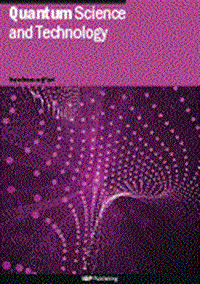变分量子算法中成本函数的有效估计和顺序优化
IF 5
2区 物理与天体物理
Q1 PHYSICS, MULTIDISCIPLINARY
引用次数: 0
摘要
经典优化是变分量子算法成功的基石,这通常需要确定成本函数相对于变分参数的导数。成本函数及其导数的计算,加上它们的有效利用,通过在复杂的景观中顺利导航,促进了更快的收敛,确保了算法在解决具有挑战性的变分问题方面的成功。在这项工作中,我们引入了一种新的问题定制优化方法,该方法将参数化量子电路概念化为不同酉算子的加权和,使成本函数可以表示为多个项的和。这种表示有助于有效地评估成本函数的非局部特征,以及它们的任意导数。然后,优化协议利用代价函数上的非局部信息来促进更有效的导航过程,最终提高追求最优解的性能。我们将这种方法用于两个不同的成本函数。第一个是相对于目标状态的变分状态的平方残差,随后用于检查由一维Burgers方程控制的流体构型的非线性动力学。第二个代价函数是一个可观测值的期望值,它后来被用来近似非线性Schrödinger方程的基态。我们的研究结果表明,与传统的优化方法相比,即使在复杂的高维景观中,收敛速度和精度也有了实质性的提高。我们的工作有助于改进变分量子算法的优化策略,为解决众多应用中的一系列计算密集型问题建立一个强大的框架。本文章由计算机程序翻译,如有差异,请以英文原文为准。
Efficient estimation and sequential optimization of cost functions in variational quantum algorithms
Classical optimization is a cornerstone of the success of variational quantum algorithms, which often require determining the derivatives of the cost function relative to variational parameters. The computation of the cost function and its derivatives, coupled with their effective utilization, facilitates faster convergence by enabling smooth navigation through complex landscapes, ensuring the algorithm’s success in addressing challenging variational problems. In this work, we introduce a novel problem-tailored optimization methodology that conceptualizes the parameterized quantum circuit as a weighted sum of distinct unitary operators, enabling the cost function to be expressed as a sum of multiple terms. This representation facilitates the efficient evaluation of nonlocal characteristics of cost functions, as well as their arbitrary derivatives. The optimization protocol then utilizes the nonlocal information on the cost function to facilitate a more efficient navigation process, ultimately enhancing the performance in the pursuit of optimal solutions. We utilize this methodology for two distinct cost functions. The first is the squared residual of the variational state relative to a target state, which is subsequently employed to examine the nonlinear dynamics of fluid configurations governed by the one-dimensional Burgers’ equation. The second cost function is the expectation value of an observable, which is later utilized to approximate the ground state of the nonlinear Schrödinger equation. Our findings reveal substantial enhancements in convergence speed and accuracy relative to traditional optimization methods, even within complex, high-dimensional landscapes. Our work contributes to the advancement of optimization strategies for variational quantum algorithms, establishing a robust framework for addressing a range of computationally intensive problems across numerous applications.
求助全文
通过发布文献求助,成功后即可免费获取论文全文。
去求助
来源期刊

Quantum Science and Technology
Materials Science-Materials Science (miscellaneous)
CiteScore
11.20
自引率
3.00%
发文量
133
期刊介绍:
Driven by advances in technology and experimental capability, the last decade has seen the emergence of quantum technology: a new praxis for controlling the quantum world. It is now possible to engineer complex, multi-component systems that merge the once distinct fields of quantum optics and condensed matter physics.
Quantum Science and Technology is a new multidisciplinary, electronic-only journal, devoted to publishing research of the highest quality and impact covering theoretical and experimental advances in the fundamental science and application of all quantum-enabled technologies.
 求助内容:
求助内容: 应助结果提醒方式:
应助结果提醒方式:


